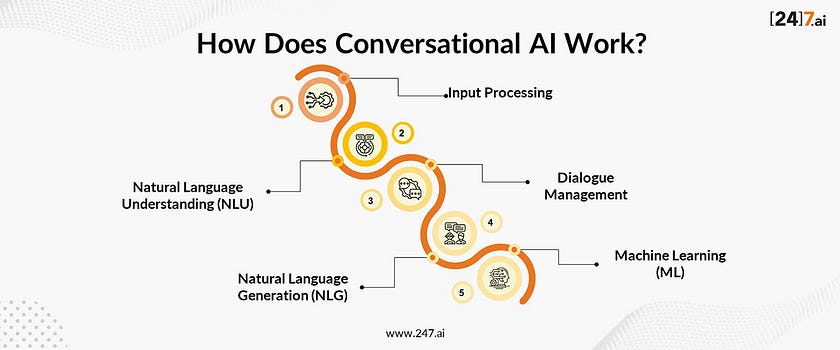Conversational AI Explained: What Is It and How It Works

Conversational AI systems operate through a sophisticated, multi-stage process designed to simulate human-like interactions:
1. Input Processing
The system begins by capturing user input — whether via voice or text. Advanced platforms can process multilingual input and detect tone, sentiment, or urgency, offering deeper insight into user emotions and intent.
2. Natural Language Understanding (NLU)
NLU is the intelligence behind the interface. It interprets the user’s message by identifying intent, extracting entities, and understanding context. Modern NLU goes beyond keyword detection to grasp nuanced language, including colloquialisms and slang.
3. Dialogue Management
Once the input is understood, the system determines the next logical step in the conversation. This may involve fetching data, asking follow-up questions, or executing specific tasks such as checking an order status or resetting a password.
4. Natural Language Generation (NLG)
The system then formulates a response in clear, human-like language — tailored to the user’s tone, communication channel, and intent. This makes interactions feel smooth, intuitive, and relevant.
5. Machine Learning
Conversational AI continuously improves over time by learning from user behavior, feedback loops, and ongoing training. This results in smarter, more accurate, and increasingly personalized experiences.
The ultimate goal: to deliver seamless, scalable, and personalized interactions that feel as natural as talking to a human.
Key Applications & Deployment Models
Conversational AI powers a wide range of applications across digital and voice channels:
- Chatbots
Deployed on websites and mobile apps, chatbots handle repetitive tasks such as FAQs, order tracking, or appointment scheduling. Modern chatbots retain context and personalize experiences based on previous interactions. - Voice Assistants
Integrated into mobile apps, smart devices, or call centers, voice assistants enable hands-free, natural-language interactions. Ideal for accessibility and on-the-go users in sectors like telecom, retail, and travel. - Virtual Agents
Designed for more complex, multi-turn conversations, virtual agents assist with processes like claims management, financial consultations, or tech support. They operate across channels and make real-time decisions. - Messaging Bots
These function across popular platforms like WhatsApp, Facebook Messenger, and SMS. They’re ideal for sending proactive alerts, handling transactional requests, and delivering mobile-first customer service.
Each deployment type addresses unique business needs — from resolving basic inquiries to managing high-stakes, complex workflows.
Cross-Industry Use Cases
Conversational AI is transforming operations across industries:
- Retail & eCommerce
Automates product suggestions, order tracking, return handling, and customer support with 24/7 availability. - Banking & Financial Services
Supports balance inquiries, two-factor authentication, loan applications, and compliance-related queries — securely and efficiently. - Healthcare
Enables appointment booking, post-care guidance, symptom checkers, and insurance Q&A — all within HIPAA-compliant systems. - Travel & Hospitality
Assists with itinerary changes, flight updates, and destination recommendations — essential for global and time-sensitive travel. - Telecom
Streamlines issue resolution, plan upgrades, and multilingual support — reducing agent workload while improving customer satisfaction.
Critical Features of Enterprise-Grade Conversational AI Platforms
To deliver consistent, secure, and scalable experiences, enterprise-grade platforms must offer:
- Omnichannel Support — Seamless interactions across web, mobile apps, messaging platforms, and voice interfaces
- AI + Human Handoff — Smart escalation to live agents when needed for complex queries
- Personalization — Contextual responses based on historical data and behavioral signals
- Scalability — Capability to handle millions of concurrent conversations
- Security & Compliance — Essential for regulated industries like finance, healthcare, and government
How [24]7.ai Empowers Enterprise Conversational AI
At [24]7.ai, we combine cutting-edge conversational AI with decades of contact center expertise to deliver truly intelligent customer engagement.
Our [24]7 Conversations platform interprets user intent, manages multi-turn context, and enables smooth transitions between bots and human agents. Paired with [24]7 Agent Services, we ensure that every interaction is fast, frictionless, and deeply human-centric.
We help global enterprises create conversations that are not only efficient and scalable — but truly feel like a natural, one-on-one experience from first touchpoint to final resolution.


Comments
Post a Comment